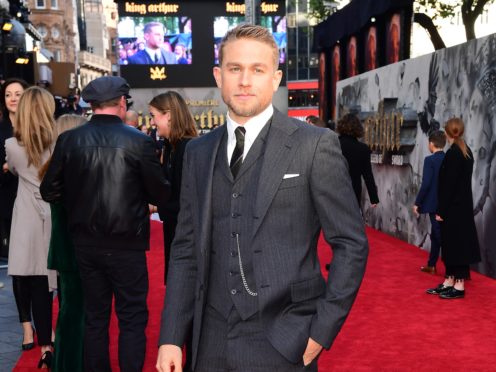Charlie Hunnam has said that claims Netflix films should not be eligible for Oscars are based on “unfounded fear”.
The debate over whether films on streaming platforms should be allowed to compete for Academy Awards has raged in the wake of the 91st ceremony.
Netflix’s main awards bid, Alfonso Cuaron’s Roma, won three gongs including best director, but was denied the main prize of best picture. The service also won the best documentary short prize for Period. End Of Sentence.
Congratulations to all our Oscar winners and nominees! What a wonderful night for cinema pic.twitter.com/65RpCVo6i4
— See What's Next (@seewhatsnext) February 25, 2019
It has since been reported that Steven Spielberg, who represents directors as an Academy governor, will speak out against considering streamed films for awards when the group convenes for this year’s annual post-Oscars meeting.
Netflix responded on Twitter, writing: “We love cinema. Here are some things we also love: Access for people who can’t always afford, or live in towns without, theatres. Letting everyone, everywhere enjoy releases at the same time. Giving filmmakers more ways to share art. These things are not mutually exclusive.”
We love cinema. Here are some things we also love:
-Access for people who can't always afford, or live in towns without, theaters -Letting everyone, everywhere enjoy releases at the same time-Giving filmmakers more ways to share art
These things are not mutually exclusive.
— Netflix Film (@NetflixFilm) March 4, 2019
Sons Of Anarchy star Hunnam, who is starring opposite Ben Affleck in the Netflix film Triple Frontier, told the Press Association: “My view is yes they should (be eligible) because my experience of making these films is that the aspiration and the work done to create them, to make them, is no different.
“But I understand, people have a vested interest in maintaining the status quo if they are on that side of this debate, so I understand why people are quite vocal about it.”
He added: “I think it’s fear and whenever you’re in a massively competitive industry there is an element of fear involved in it always but I think it’s unfounded fear.
“I think that the perception of the argument that can be made is that the streaming platforms are going to provide the death blow to the theatrical experience and I personally don’t think that is the case and I don’t think that so far there is any evidence that suggests that is occurring.
“Box office revenues continue to be robust and so I think it is a fear, I just don’t know how founded it is.”
The Newcastle-born actor said he believes streaming platforms are providing opportunities for filmmakers that no longer exist in the studio system, where the focus is on making blockbusters from material that already has a fan base.
He said: “The reality is that the studio theatrical system has been rapidly shrinking over the last 10 years, it’s gotten so competitive that the volume has shrunk.
“In 1998, when I came to America and started working in film, the studio system were responsible for about 600 movies a year, right now we are operating at about 10% of that so obviously the consequence of that is the opportunities for everyone who works in film rapidly reduces.
“That is based upon the trajectory of the expectation around spectacle and the theatrical experience and that grand spectacle is incredibly expensive to produce.
“There was a certain level of cooperation within the studios to not compete with each other on the weekends, people will, two years ahead, claim a weekend and everyone else stays away from that, and because of the enormous cost associated with that there is a fear or a necessity to have the pre-existing awareness of the subject matter going into it.
“So then you have this cannibalising cycle which prevents original, daring programming from being made for theatrical release.
“I’ve seen that trajectory very, very clearly in the last 10 years of my career and in the opportunities that present themselves.
“So what I think that the streaming platforms do is create a venue for that smaller, more original and more difficult material to get made.
“Obviously as a participant in film-making I love it and think it’s very, very valuable and I don’t think the two need to be in enormous conflict.
“It’s almost like the two can be mutually exclusive because within what I just said, they are providing different things for the most part. There is obviously overlap but they are providing different services.”
Triple Frontier is streaming on Netflix now.
